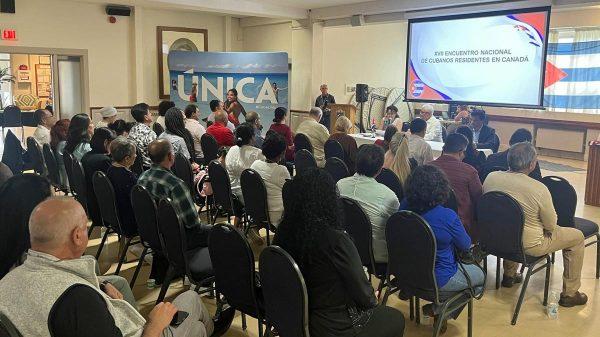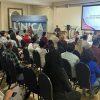May 8th, 2019. It is a date that those with ties between Canada and Cuba know well. From the early morning hours, as media began to break their news stories for the day, the Government of Canada was making its announcement that, effective immediately, all visa processing at its Canadian Embassy in Havana, Cuba would be terminated.
The embassy, having been reduced to a skeletal staff (from 16 to eight in a matter of months) due to the mysterious “Havana Syndrome” that had affected several diplomats and their families, and that has since drawn a $28 million lawsuit against the Canadian government, claimed it was no longer in a position to handle the onslaught of temporary resident visa (TRV) and permanent resident applications that were crossing its desk. Going forward, all applications would be redirected to Mexico City’s visa application centre, and all Cuban applicants would now be required to travel outside of Cuba for services including biometrics and medical exams, without any certainty that their applications would be approved by Immigration, Refugees and Citizenship Canada upon completion of these steps.
With the average Cuban earning between $20-$40 USD in a month, if there was ever an impossible task to carry out, this might be it.
If this sounds like Groundhog Day, it’s likely because the United States made an identical decision to reduce its embassy staff to a minimum, due to the same (to this day) undiagnosed illness, over a year before its neighbor to the north. The U.S., too, is making Cuban citizens travel to a third country for biometrics and, rather than the five-year multiple-entry tourist visa it used to offer successful Cuban applicants, in the name of “reciprocity”, a tourist visa will now only be valid for three months and with a one-time entry.
As a (temporarily) Havana-based Canadian married to a Cuban who is six months into a year-long application process for Canadian permanent residency, this announcement was not the next update from my government we had been hoping for. While we were just two people in the cog, we were aware that the impact of this decision would be profound with lasting strain for those with links between the two countries.
Though 1.5 million Canadians visit this small Caribbean island annually, Cuba is more than its sandy beaches, tropical drinks and salsa clubs. It is a profoundly unique country that is home to artists and academics, business people and cultural icons alike. There are family members abroad, and marriages separated by a permanent resident card.
Knowing all of this, as well as the challenges that Cubans face with traveling outside (visas to other countries are difficult, if not impossible, to obtain, and visa-free countries can be prohibitively expensive to travel to), these new regulations have created complications that, while not completely closing the door for Cubans to visit – or relocate to – Canada, strongly discourage the idea.
For these reasons, almost immediately post May 8th, the floodgates of “activism” opened. Canadians (and Cuban communities in Canada) took to writing their Members of Parliament and peacefully took to the streets, in organized rallies, to express their dissatisfaction and dismay. Media was contacted and articles were published.
Still, I lay wake at night wondering what more we could do to elevate the voices and show the faces of those directly impacted by the change. Documenting their stories, via film, seemed like the ideal way to do so, and being on the ground in Havana afforded me the privilege to get even closer to the source.
Given the time sensitivity of the issue, and wanting to put some pressure on the government while the iron was still hot, my husband, Fidel, a talented graphic designer and video editor, and I lined up our interviews and dove in. We worked around the clock, and as quickly as our abilities would allow us, to get a short documentary produced and circulated. On June 3rd, we uploaded the finished product to YouTube, and it amassed over 1,000 views in less than 48 hours. [embedyt] http://www.youtube.com/watch?v=nM8zt7cyeUk[/embedyt]
The documentary is intended to be a reflection of the diversity of this issue. It features two married Canadian-Cuban couples in Canada anxiously waiting to invite their Cuban family members for a visit, a Cuban grandmother who will no longer have an opportunity to witness the precious first months of her newborn grandson, an esteemed elderly Cuban scholar, with many visits to Canada under her academic belt, whose TRV had recently expired and who had to subsequently cancel her plans to travel to Canada due to the new requirements, and a young Cuban PhD student who had the good fortune of receiving his study permit before this change was announced, and who makes the case for why this amendment only exacerbates the “haves” and the “have nots” of Cuban students wanting to further their education in Canada.
While filming, we discovered that, though the experiences are distinct, the outcome is ultimately the same: the termination of visa processing services in Cuba means that Cuban/Canadian families will be separated, Cuban scholars will no longer be able to exchange ideas and share knowledge with their Canadian counterparts, Cuban students will no longer be the alumnae of Canadian academic institutions, Cuban musicians will no longer be able to perform in sold-out Canadian venues, Cuban athletes will no longer have a chance to play their sport in Canadian stadiums and arenas to crowds of cheering fans, and Cuban professionals working between the two countries will now have to wait for their Canadian colleagues to travel to them to get down to business. This list goes on, but let’s leave it here for now.
The issue at hand is not simply that the Government of Canada made this decision. It’s that it made this decision, seemingly without regard for the Cuban people (and Canadians, as well, for that matter) and the unusual set of circumstances that exist on an island with historically limited access to the outside world. These exchanges between Canada and Cuba offered a lifeline of access, and have enabled Cubans to broaden their horizons in ways – and share their culture with other countries, like Canada – not previously permitted to the island’s inhabitants. While US-Cuba relations have been contentious for too many years to count, Canada, a country that prides itself on being the “moral leader of the free world”, has preserved a longstanding friendship with Cuba… one that now feels like it’s on the brink of a breakdown.
Though Canada has maintained that it shut down parts of its embassy in Havana to prioritize the health of its staff (and I respect this), it feels like there is more going on behind the scenes that the public is not privy to, and information is being withheld. As a Canadian based in the city where this whole health crisis manifested itself, I don’t walk through the streets of Havana feeling like my health is at risk. In fact, of all the cities and countries I’ve lived in around the world (and there are many), Havana is one of those cities where I feel the safest. Coming from a democratic society, with an elected government that works for – and on behalf of – its citizens, naturally, I want answers.
The symptoms felt by Canadian embassy staff did not occur in the embassy itself, but rather in the homes of the diplomats. With this in consideration, it’s not clear why biometrics would have to be moved to another country and panel physicians would no longer be available to see in Cuba. No one is questioning the government’s prioritizing the well-being of its diplomats abroad, but I will reason that there are ways to keep health at the top of the agenda while also continuing to make these services readily available in Cuba. If not in Havana, there are other cities, such as Guardalavaca and Varadero (both with Canadian consulates), on the island that could host these services for Cuban citizens. Results would then be collected, en masse, by an embassy or consulate employee, and someone would be charged with the responsibility of mailing the results to Mexico City. This would avoid the stress of having to process the applications with limited staff, while still relieving Cubans (and their associates) of the financial and emotional burden that will come with having to travel to a third country, and the potential for associated delays in the processing of these applications.
I’m not alone in my request either. If those featured in the documentary are an example (and they are) of what Cubans and Canadians are feeling right now, if the organized demonstrations, the media exposure and the sleepless nights are any indication, people have a stake in this matter. Canada has long been a country I’ve been proud to call home. The world over, ours is seen as a nation that stands up for human rights and moral injustices, one that welcomes foreigners and immigrants with open arms. Cuba is home to many citizens worthy of Canada’s welcoming. With the world watching, let us continue to lead by example. It’s not too late.

Jacqueline holds a Master’s Degree in International Communications and Development from City, University of London, and has spent the past several years living and working abroad with a diverse roster of international organizations and start-up enterprises. Her work has taken her throughout Canada, the United States, Brazil, Austria, India, and Zambia, and she has traveled extensively in East, West, and South Africa. Jacqueline is passionate about human rights issues and international relations, and her mantra is ‘so long as we live in this world, we have a responsibility to it’.











